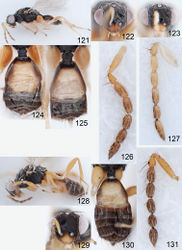Euplectrus davesmithi
| Notice: | This page is derived from the original publication listed below, whose author(s) should always be credited. Further contributors may edit and improve the content of this page and, consequently, need to be credited as well (see page history). Any assessment of factual correctness requires a careful review of the original article as well as of subsequent contributions.
If you are uncertain whether your planned contribution is correct or not, we suggest that you use the associated discussion page instead of editing the page directly. This page should be cited as follows (rationale):
Citation formats to copy and paste
BibTeX: @article{Hansson2015ZooKeys, RIS/ Endnote: TY - JOUR Wikipedia/ Citizendium: <ref name="Hansson2015ZooKeys">{{Citation See also the citation download page at the journal. |
Ordo: Hymenoptera
Familia: Eulophidae
Genus: Euplectrus
Name
Euplectrus davesmithi Hansson sp. n. – Wikispecies link – ZooBank link – Pensoft Profile
Material
Holotype a female labeled “COSTA RICA: Guanacaste, ACG, Sector Pitilla, Pasmompa, 24.ix.2005, gusaneros, ex Ceromacra Poole01 eating Guatteria diospyroides, sibling of wasp DHJPAR0028811, 05-SRNP-34118” (BMNH). PARATYPE: 1♀ with same label data as holotype (INBio).
Diagnosis
Lower face medially yellowish-brown, pale area reaching to outer lateral margins of toruli (Fig. 129); scutellum transverse, 0.8× as long as wide, with very weak engraved reticulation, partly smooth (Fig. 137); dorsellum without spines posteromedially (Fig. 749); legs yellowish-white (Fig. 128); propodeum anteromedially with triangular cup short and wide (Fig. 749); petiole 1.0× as long as wide; gaster dark brown, anterior ½ with a large yellowish-white spot (Fig. 130).
Description
Female. Length of body 2.0 mm. Antenna with scape and pedicel yellowish-brown, flagellomere 1 pale brown, 2–6 dark brown (Fig. 131). Mandibles and palpi yellowish-white. Head black and shiny, lower face medially yellowish-brown, pale area reaching to outer lateral margins of toruli, with parts between pale area and eyes black (Fig. 129), vertex dark brown. Frons close to eyes with one sparse row of setae (Fig. 135). Vertex smooth (Fig. 136). Occipital margin with a weak carina behind ocellar triangle (Fig. 136).
Mesosoma black and shiny (Fig. 128). Each sidelobe of mesoscutum with seven setae. Scutellum 0.8× as long as wide; with very weak engraved reticulation, partly smooth (Fig. 137). Dorsellum along anterior margin with a groove that is divided by longitudinal carinae (Fig. 749), groove medially 0.2× as long as length of dorsellum, median posterior margin of dorsellum without spines. Propodeum smooth (Fig. 749); anteromedially with a short and wide semicircular cup; propodeal callus with eight setae. Legs yellowish-white (Fig. 128). Fore wing: costal cell with two rows of setae on ventral surface, and margin with five setae close to marginal vein; with 25 admarginal setae, in two irregular rows.
Gaster dark brown, anterior ½ with a large yellowish-white spot (Fig. 130).
Ratios. HE/MS/WM = 1.8/1.0/1.1; POL/OOL/POO = 3.7/1.8/1.0; OOL/DO = 1.3; WE/WF/WH/HH = 1.0/2.6/4.4/3.3; WH/WT = 1.1; PM/ST = 2.0; TS1/TS2/LT/LT1/LT2/LT3/LT4 = 6.3/2.8/7.7/2.3/1.7/1.0/2.0; LP/WP = 1.0; MM/LG = 0.9.
Male. Unknown.
Hosts and biology
Feeding on second instar larva of Ceromacra Poole02 (Erebidae) feeding on Guatteria diospyroides (Annonaceae), parasitoid cocoons stuck to leaf substrate.
Distribution
Costa Rica (Guanacaste Province).
Etymology
This species is named after Dave R. Smith, in recognition of his contribution to the understanding of ACG Hymenoptera taxonomy.
Remarks
Euplectrus davesmithi and Euplectrus victoriapookae have the same barcode (Fig. 35, Suppl. material 1), but as they are morphologically distinct and their hosts are very different we treat them as separate species.
Original Description
- Hansson, C; Smith, M; Janzen, D; Hallwachs, W; 2015: Integrative taxonomy of New World Euplectrus Westwood (Hymenoptera, Eulophidae), with focus on 55 new species from Area de Conservación Guanacaste, northwestern Costa Rica ZooKeys, (485): 1-236. doi
Images
|
Other References
- ↑ Saitou N, Nei M (1987) The neighbor-joining method: A new method for reconstructing phylogenetic trees. Molecular Biology and Evolution 4: 406–425.
- ↑ Kimura M (1980) A simple method for estimating evolutionary rate of base substitutions through comparative studies of nucleotide sequences. Journal of Molecular Evolution 16: 111–120. doi: 10.1007/BF01731581
- ↑ Tamura K, Stecher G, Peterson D, Filipski A, Kumar S (2013) MEGA6: Molecular Evolutionary Genetics Analysis version 6.0. Molecular Biology and Evolution 30: 2725–2729. doi: 10.1093/molbev/mst197
![Figure 35. Interspecific variation of DNA barcodes among species of ACG Euplectrus displayed using the Neighbor-Joining method (Saitou and Nei 1987[1]) with distances computed using the Kimura 2-parameter method (Kimura 1980[2]) conducted in MEGA6 (Tamura et al 2013[3]). When there was more than one sequence available for each species, the representative sequence was selected based on quality (longest read length with the fewest ambiguities). Line labels are the voucher code|species name|host family|number of barcoded specimens in the ACG database at the time of writing. In the two cases where two species have nearly identical barcodes, morphological differences suggest that each pair indeed contains two species, the veracity of which will be the subject of further research when more samples are available.](https://species-id.net/o/thumb.php?f=Zookeys-485-e4835-g011.jpg&width=205)


